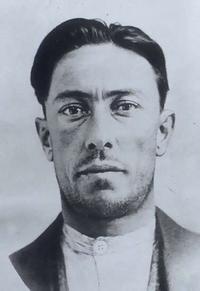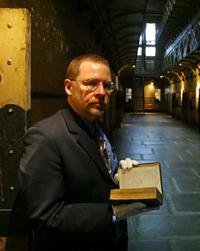
Colin Campbell Ross
Wrong man hanged says author
By Steve Waldon

Colin Campbell Ross
Just on 10am on April 24, 1922, the Old Melbourne Gaol hangman pulled the gallows lever and Colin Campbell Ross fell to his fate.
Arrested in January and then convicted of the rape and murder of schoolgirl Alma Tirtschke the previous December, Ross was resigned to meeting his doom and must only have hoped for an instant death.
Instead, the knot of the noose did not run freely. Authorities had decided to experiment with a four-stranded rope rather than the usual three-stranded European hemp.
Ross did not die immediately because his spinal cord was fractured, not severed. Although his windpipe was torn and obstructed by his destroyed larynx, the condemned man continued with rasping breaths and convulsed on the rope.
Three times Ross bent his knees and flexed his arms as he battled his killer bonds, before succumbing. It is thought his death by asphyxiation took eight to 20 minutes.
What makes this episode in Victoria's judicial history more harrowing is that, according to a new book, Ross almost certainly was innocent.
Researcher Kevin Morgan's Gun Alley: Murder, Lies and Failure of Justice, to be launched on Monday, explains how public hysteria, media criticism of police and politicians, and the testimony of unreliable witnesses conspired to assure Ross' hanging.
Morgan exposes serious flaws in the prosecution case and concludes that were the case to be tried today, Ross could not be convicted.
He spent many hours over the past decade scrutinising documents, some sealed for 75 years. He says Ross' death was an expedience to quell a baying city spooked by the 12-year-old Alma's death.
Morgan also found that Alma's younger sister, Viola, was living in Melbourne. In a series of conversations with her in 1996-97, Morgan was given a glimpse of something that gives his book a potency he could not have imagined when he first hit the detective trail - Alma's likely killer.
The book names a man known to Alma and Viola, recounting his pedophilic tendencies and the girls' mistrust of him. Morgan then outlines a scenario in which the man probably murdered Alma. And it was not Colin Campbell Ross.
One is Betty, the other is Bettye. When they meet on Monday, they will share much more than a name - they are bonded by what happened to Alma Tirtschke some time after 3pm on December 30, 1921.
Bettye Arthur lives in Melbourne's eastern suburbs. She is Alma's niece - Viola's daughter. Until she was about six or seven, Bettye Arthur believed the aunt Alma she never met was the victim of a traffic accident. Her mother told her the truth, but swore her to secrecy. She honoured that for decades.

Kevin Morgan author of sensational new book on the Gun Alley Murder, in
which Colin Ross was wrongfully executed in 1922.
Photo:Nicole Emanuel
Viola, Bettye Arthur says, married a month after turning 21, and resolved to start life afresh. "She'd had a tough life until then," she says. "She'd lost her mother on the ship coming back to Australia, then her grandfather, then Alma, and then her father (in a hunting accident). But she gave us a good childhood - she's been a strong woman."
Betty Everett lives in northern NSW. Her father, Stan Ross, was the younger brother of Colin Ross.
Now a spritely 75, Betty Everett recalls that the uncle Colin she never knew was a family secret. When she was about 15, Betty Everett saw in a bible the dates of birth of her father and his siblings, Lexie, Ron and Thomas. But there was another name: Colin Campbell Ross. She and her sister did not know about Uncle Colin and, the times being what they were, felt unable to approach their parents about the mystery.
"The next occasion I became aware of some secret was upon a visit of Aunt Lexie," Betty Everett says. "She was talking to my mother and I heard the words 'Do the girls know?' This concerned me, but I did not feel I could ask my parents the meaning of these words."
Stan Ross never mentioned his wrongly executed brother to his daughters and, even as adults, they did not raise it with him.
Betty Everett discovered the truth in the early 1950s in a magazine article about the murder. She nearly fell over when she saw the photo of Colin Campbell Ross. "He looked so much like my father that I couldn't mistake him," she says.
Apart from the shock of reading about a relative being linked to such a crime, Betty Everett was intrigued by the article's conclusion. "The reporter had been at Colin's hanging and his article expressed his belief that the hanging was of an innocent man," she said.
Betty Everett had further cause to believe her uncle's innocence when her husband, Keith, came across a pamphlet by trial barrister Thomas Brennan, who wrote it not long after Ross was hanged.
Brennan's review of the trial, although observing the conventions of legal dignity, could be read as a condemnation of Ross' conviction. Brennan cites the inadequacy of the judge's summing-up to the jury, blatant contradictions by Crown witnesses and evidence crucial to establishing Ross' innocence not being permitted.
Now Betty Everett had two sources questioning the conviction. Forty years later, when Morgan tracked down Betty Everett and said his research all but proved Ross' innocence, she felt as though the family's soul had been freed from taint.
She is an enthusiastic supporter of efforts to have her uncle pardoned.
The book is a critical step, "but it would be good after all this time to have Colin Ross' name cleared legally, to have recognition that it was a miscarriage of justice", she says.
The possibility that Colin Ross was executed for a crime he did not commit was first revealed in The Sunday Age on March 5, 2000, when Morgan's investigation was in its seventh year.
His conclusions took everyone back in time, confronting them with the face of a condemned man who steadfastly proclaimed his innocence. They explained how and why some disreputable prosecution witnesses were swearing Ross' life away, and offered alibis for the key times of the murder and disposal of the body.
And yet, as Morgan's book recounts, Ross' path - from the police interview to his arrest, the trial, conviction and the botched hanging - has an inexorability about it. Readers who believe a jury and the criminal justice system would serve Ross well come to realise, with a growing sense of dread and incredulity, that he is doomed.
Colin Campbell Ross was a bit of a scoundrel, but essentially harmless. He lived with his mother and a brother in Maidstone. He loved and was respectful to his mother, and she loved him. Ross was not uneducated, just a bit rough around the edges.
He ran the Australian Wine Saloon in the Eastern Arcade, between Bourke and Little Collins streets. It was not a salubrious establishment, but neither was it a den of evil.
The saloon was at the southern end of the arcade, near Little Collins Street. . Just a few metres away, where Alfred Place runs off Little Collins Street, Alma Tirtschke was last seen about 3pm on December 30, 1921.
Reliable witnesses who had nothing to lose or gain by telling police what they knew said Alma was dawdling, apprehensive and obviously afraid.
In retracing her last hours, Morgan successfully paints a picture of a girl, on the verge of puberty but truly innocent, about to endure something wretched. Her task that day had been to go from her grandmother's house in Jolimont to a Swanston Street butcher's, collect a parcel of meat, drop it at an aunt's Collins Street home and return to Jolimont.
It was uncharacteristic for Alma to take so many hours to complete the task. She knew her grandmother would be worried. A witness says he saw a man - not Colin Ross - following Alma. Other witnesses say Alma looked over her shoulder with trepidation, and dallied in the block bounded by Little Collins, Russell, Bourke and Exhibition streets as though she did not know where to go.
Morgan believes Alma was afraid she was being stalked by a man she knew and of whom she was wary. Why didn't she go to her aunt's Collins Street home and drop the parcel as instructed? Who did she fear might be there? Why didn't she return to Jolimont? Was there something she couldn't tell her grandmother?
Her naked body was found early the next morning in a lane running east off Gun Alley, not far from Alfred Place.
Morgan has been able to establish that Ross could account for his movements at the time Alma disappeared, and later that night, when her body was dumped in Gun Alley. With nothing to hide, Ross told detectives who interviewed him that a girl matching Alma's description had passed his saloon. He saw her in the arcade.
Kevin Morgan was aware that if his theories were correct, everyone associated with the case were going to have to reassess what they knew about it.
He decided truth would demand an absence of censorship, yet what of the feelings of the various families involved?
In the case of Senior Detective Fred Piggott, who led the police investigation, Morgan traced a grandson and explained that the book would most likely raise some awkward questions about his grandfather's motives.
"That family has been tremendously supportive and understands that it seems the wrong person has been executed," Morgan says.
It is such a long time ago, yet in deference to Colin Ross' reputation, Morgan pushed on.
Detectives Piggott and John Brophy, he says, were good and competent men feeling the enormous weight of public expectation of an early arrest. They were investigating in a climate of public hysteria, intense media scrutiny and political pressure to get a conviction.
Morgan concludes that suggestions Piggott planted evidence that condemned Ross, are untrue.
For Viola, Bettye Arthur and her family, Morgan eliminates the suggestion made during the trial that Alma was responsible for her fate.
For Betty Everett and her family, Colin Ross' name has been cleared to their satisfaction, and a stigma removed.
Betty Everett was born in the Maidstone house where her Uncle Colin had slept the night of Alma's murder. Her father - Colin's brother Stan - and his wife moved in after Colin's execution to take care of matriarch Elizabeth Ross.
Morgan's book, although confronting, has given her peace of mind. Perhaps more importantly, she has come to appreciate her long-suffering parents anew, and to understand that families comprise disparate personalities.
"Colin was portrayed as not a very nice man and considering that my father was part of this unpleasant company and surroundings, I am proud that at all times during my life he was a gentleman," she says.
"Not only a gentleman, but a gentle man. Truly an example of how one can overcome adversity."
Gun Alley: Murder, Lies and Failure of Justice, $29,95, published by Simon and Schuster, distributed by HarperCollins.
613-797-3237